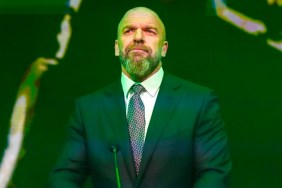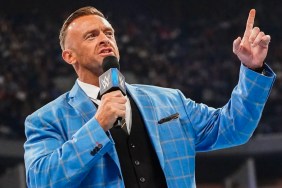Triple H spoke with the WWE.com while participating in an international media call, and below are some interview highlights:
WWE.COM: When you embark on a project the scale of the WWE Performance Center, you set your benchmarks and goals and five-year plans. As the Performance Center nears its four-year anniversary, how has the experience compared to your expectations for it at the outset?
TRIPLE H: It has by far surpassed them. The difficult part about doing something like the Performance Center and the changes we made recruiting is that you’re breaking into uncharted waters and not knowing what exactly to expect. As we opened up the Performance Center, I knew it would be big, but it’s funny. Vince [McMahon] said to me at the time that he believed it was the biggest thing we did since the company went public. It stuck with me when he said that, because I hadn’t realized the magnitude of it. It made me start seeing it differently.
I envisioned us being where we’re at, but I think I envisioned it after the five- or six-year mark. Two years into this, I feel like we had completely transformed what we were prior in terms of recruiting and training, and at the four-year mark we have outgrown the entire system. It’s beyond what I expected.
WWE.COM: The Performance Center is more diverse than ever. You see a huge variety of athletic backgrounds, cultural backgrounds and body types. Why is diversity such a crucial ingredient in maintaining a healthy developmental system, and how has that driven recruiting efforts?
TRIPLE H: First of all, the diversity and the mix of what’s here in the PC is very deliberate. We look for gaps in our diversity, for places we need to improve it. I want to have the right mix. WWE wants there to be the talent that resonates with the kid in China or the kid in India, and to me, I break it down very simply: There’s a desire from the standpoint of those fans, but to me, talent is talent. I don’t care where they come from in the world. It’s one big planet and it’s one big, giant group of people who are potential talent to us, so why would I limit it some area of the world? I want to find the best talent there is –the best athletes, the most professional, that have massive amounts of charisma – and I want to teach them how to become global stars.
Once you recruit [talent] from everywhere, it just increases your viewership everywhere. It makes us more and more of a global brand, which we are, but when you take into consideration now not only television, but digital, social media, WWE Network … the world is becoming a much smaller place. The entire world this Sunday will watch WrestleMania live. There are very few pockets in the world where you can’t watch WrestleMania live. We live in an amazing time.
WWE.COM: To that point, WWE has working relationships with organizations, such as EVOLVE Wrestling, and we’re seeing PROGRESS and Insane Championship Wrestling talent at Axxess this weekend, for the first time ever. You’ve spoken in the past about the concept of opening Performance Centers around the world, in different markets. Are we moving toward an ecosystem that maybe resembles the territories, but under the umbrella of WWE?
TRIPLE H: I think so. It’s hard to say territories, because it’s different no matter how you look at it. I think now you’ll always have the one global brand. When I look at the U.K., we did the [United Kingdom Championship Tournament] because there’s a substantial talent base in the U.K. that we knew of. We were hoping to bring guys into the system, but there’s only so much bandwidth to bring them in. To work with PROGRESS and ICW in the U.K., to create our own localized content within the U.K. and have that pathway lead to NXT and the main roster, is something that never existed before. You can go and ask a guy like Finn Bálor from Ireland. He never thought WWE was a play for him, ever. Even when he was in Japan as a big star there, when we first had the conversation with him, he thought it was a pipe dream and that it was never going to happen. He didn’t know if it was the right fit for him, and he thought that he might get gobbled up.
I want to change that. If you’re in the U.K. and you’re a great performer, why is the pathway not there as it should be every place else? I want to create that pathway. The deeper the talent pool, the better it is for everybody. By going and looking at these guys at PROGRESS and ICW and then giving them something to shoot for, and then something bigger — which is hopefully going to be this U.K. show — that gives them a clear path. If you’re an 18-year-old kid — I shouldn’t say that, because Tyler Bate is 19 and already the U.K. Champion — but if you’re the kid who wants to be a WWE Superstar, what do you do? You get trained. Well, we’ll work on that. You start at a PROGRESS or an ICW, start to hone your career and succeed in those places that put eyeballs on us and bring you into the U.K. show. And that U.K. show allows you to be seen on a much more global basis, to get to NXT, to get to WrestleMania.
Fans that are local to those areas that have an affinity for those talent, they see the guy from down the road who came from nothing, and they watch him grow from working in front of 20 people to suddenly making it to TV and WWE Network, and become something more. There’s an investment in that talent that you can’t put a value on. That’s where a lot of the success in those individual markets comes. But what if you start to replicate that in different places around the world?
You look at China and say Yao Ming lit the NBA up for them. I have 10 Chinese talent right now that we’re trying to cultivate to be a Yao Ming for us. That makes people in that country go, “Wow, one of us is there, let’s see what he can do.” Tian Bing is going to compete this Sunday in the Andre the Giant Memorial Battle Royal, so for China that’s a massive step. I can tell you that the talent we have from there are phenomenal. It’s just time. All of this stuff takes time, and it’s a cultivation, a grassroots way of making people see the product, enjoy the product, get invested in their localized talent, and then going to that global level.

 Nick was born and raised in Detroit, Michigan, and lived there until the age of 18, when he decided to pack his flack jacket and move to New York City.
Nick was born and raised in Detroit, Michigan, and lived there until the age of 18, when he decided to pack his flack jacket and move to New York City.






